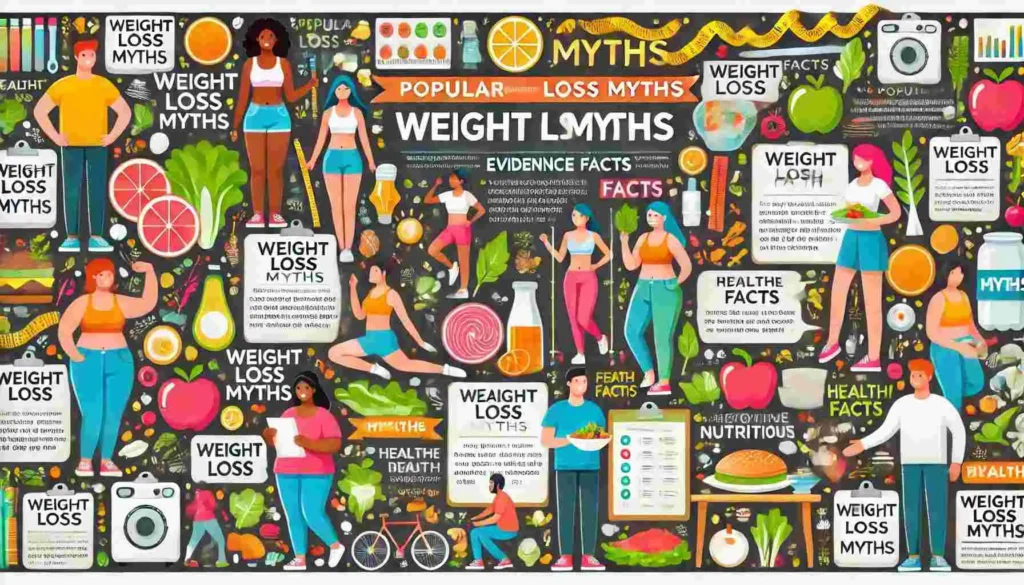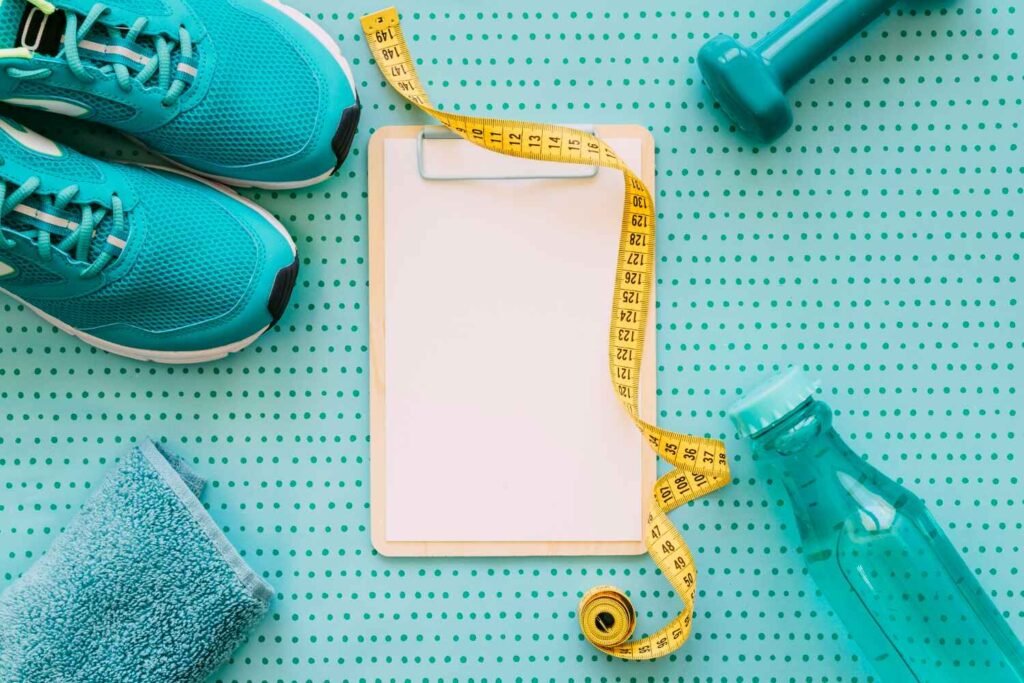
Debunking Popular Weight Loss Myths: What Really Works
Introduction
Weight loss is a topic surrounded by a whirlwind of myths and misconceptions. From fad diets to miracle cures, many approaches promise quick results but often fail to deliver sustainable outcomes. Understanding what truly works requires debunking these myths and focusing on evidence-based strategies.
Part 1: Common Myths About Weight Loss
Myth 1: Carbs Are the Enemy
One of the most pervasive myths is that carbohydrates cause weight gain. While low-carb diets can lead to initial weight loss due to water retention, carbs are essential for energy. The key is distinguishing between refined carbs, like sugary snacks, and complex carbs, such as whole grains, which provide sustained energy and support overall health.
Myth 2: Eating Fat Makes You Fat
Contrary to popular belief, not all fats are bad. Healthy fats, like those found in avocados, nuts, and olive oil, are crucial for hormone regulation and satiety. Avoiding fat altogether can lead to nutrient deficiencies and increased cravings for unhealthy foods.
Myth 3: Skipping Meals Helps You Lose Weight
Skipping meals, especially breakfast, is often seen as a shortcut to weight loss. However, this practice can lead to overeating later in the day and disrupt your metabolism. Eating regular, balanced meals helps maintain energy levels and promotes better portion control.
Myth 4: You Can Target Fat Loss in Specific Areas
Spot reduction—focusing on losing fat in specific areas like the belly or thighs—is a common misconception. Fat loss occurs systemically, not locally. Combining regular exercise with a balanced diet is the most effective way to reduce overall body fat.
Myth 5: Crash Diets Are the Fastest Way to Lose Weight
Crash diets may yield rapid weight loss, but the results are often short-lived. Such diets are typically unsustainable, leading to muscle loss and a slowed metabolism. Sustainable weight loss requires gradual changes in dietary and lifestyle habits.
What Actually Works for Weight Loss
1. Balanced Diet Over Restrictive Eating
Instead of eliminating entire food groups, focus on a balanced diet that includes all macronutrients—carbohydrates, proteins, and fats. Incorporate plenty of fruits, vegetables, lean proteins, and whole grains to provide essential nutrients and keep you feeling full.
2. Regular Physical Activity
Exercise is a cornerstone of weight management. Incorporating a mix of cardiovascular exercises, strength training, and flexibility exercises promotes overall fitness and helps maintain muscle mass while losing fat.
3. Mindful Eating
Paying attention to hunger and fullness cues can prevent overeating. Eating slowly, savoring each bite, and avoiding distractions like television during meals fosters a healthier relationship with food.
4. Hydration Matters
Often overlooked, hydration plays a critical role in weight loss. Drinking water before meals can help control appetite, and staying hydrated boosts metabolism and supports overall health.
The Truth About Popular Weight Loss Strategies
Myth 6: Eating After 6 PM Causes Weight Gain
A widely believed myth is that eating late at night automatically leads to weight gain. However, it’s not the timing of your meals that matters but the total calories consumed and your food choices. Eating a balanced meal in the evening doesn’t lead to weight gain unless it exceeds your daily calorie needs.
That said, late-night snacking on high-sugar, processed foods can contribute to weight gain. To avoid this, focus on healthy options like fruits, yogurt, or a handful of nuts if you’re hungry before bed.
Myth 7: Detox Teas and Cleanses Aid Weight Loss
Detox teas, juices, and cleanses are often marketed as weight loss solutions. However, they usually result in temporary water loss, not fat loss. Most of these products lack scientific backing and may lead to dehydration or nutrient deficiencies.
Instead of relying on a “quick fix,” support your body’s natural detoxification by staying hydrated, eating fiber-rich foods, and including plenty of fruits and vegetables. Your liver and kidneys naturally cleanse your body when given the proper nutrients.
Myth 8: Weight Loss Supplements Are the Key to Success
Weight loss supplements promise miracle results, but many are ineffective and can even be harmful. Some supplements may suppress appetite temporarily or increase metabolism slightly, but they aren’t a replacement for healthy eating and regular exercise.
In fact, relying on supplements can lead to frustration when long-term results don’t match expectations. Focus on proven strategies like balanced meals, regular movement, and mindful eating instead of quick-fix pills.
Myth 9: Cardio is the Only Way to Burn Fat
While cardio exercises like running, cycling, and swimming are great for burning calories, they’re not the only way to lose weight. Strength training is equally essential for sustainable fat loss. Building muscle helps boost your metabolism, meaning you burn more calories even at rest.
A balanced fitness routine that includes cardio, strength training, and flexibility exercises offers the best results for weight loss and overall health. Incorporating activities like weightlifting, yoga, and high-intensity interval training (HIIT) can maximize fat burning and improve muscle tone.
Myth 10: If You’re Not Losing Weight, You’re Not Trying Hard Enough
Weight loss is influenced by various factors, including genetics, metabolism, hormone levels, and lifestyle. Blaming yourself for slow progress is counterproductive. Instead of focusing solely on the scale, celebrate non-scale victories like improved energy levels, better sleep, and increased strength.
Sometimes, small tweaks in your routine, like managing stress, getting quality sleep, or adjusting portion sizes, can make a significant difference. Be patient and kind to yourself during the process.
Evidence-Based Strategies for Sustainable Weight Loss
1. Prioritize Protein for Satiety and Muscle Maintenance
Protein is crucial for weight loss because it helps you stay full and supports muscle maintenance. Including protein-rich foods like eggs, lean meats, fish, beans, and legumes in every meal can reduce hunger and cravings.
Aim to include a source of protein with every meal to boost metabolism and maintain lean muscle mass. This approach helps ensure that you’re losing fat, not muscle, during your weight loss journey.
2. Get Enough Sleep
Lack of sleep can disrupt hormones that regulate hunger, such as ghrelin and leptin, leading to increased appetite and cravings. Poor sleep is linked to weight gain and difficulty losing weight. Adults should aim for 7-9 hours of quality sleep each night to support overall health and weight management.
Create a relaxing bedtime routine, limit screen time before bed, and ensure your sleep environment is cool and dark to improve sleep quality.
3. Manage Stress Levels
Chronic stress can lead to weight gain by increasing the hormone cortisol, which triggers cravings for high-fat and sugary foods. Practicing stress management techniques like meditation, deep breathing, yoga, and regular exercise can reduce cortisol levels and support weight loss.
Taking time for self-care and relaxation helps maintain a balanced lifestyle, making it easier to stick to healthy habits.
4. Consistency Over Perfection
One of the most critical aspects of weight loss is consistency. It’s easy to feel discouraged by occasional setbacks, but progress comes from maintaining healthy habits over time. Aim for the 80/20 rule: eat nutritious foods and stay active 80% of the time while allowing for occasional indulgences.
Perfection isn’t necessary for success; consistency is what leads to long-term results. Small, sustainable changes are more effective than extreme measures.
5. Track Your Progress in Multiple Ways
Relying solely on the number on the scale can be misleading. Track your progress through various methods, such as:
- Body measurements (waist, hips, arms)
- Progress photos
- Fitness milestones (running a certain distance, lifting heavier weights)
- Energy levels and mood
This holistic approach helps you stay motivated and recognize improvements beyond just weight.
Practical Tips for Long-Term Weight Loss Success
1. Build Healthy Eating Habits You Can Stick To
Fad diets come and go, but sustainable weight loss is rooted in healthy eating habits you can maintain for life. Instead of focusing on restriction, think about adding nutritious foods to your meals.
- Eat More Whole Foods: Prioritize fruits, vegetables, whole grains, lean proteins, and healthy fats. These foods are nutrient-dense and keep you feeling satisfied.
- Plan and Prep Meals: Preparing meals ahead of time can help you avoid unhealthy, last-minute choices. Create a weekly meal plan and prep ingredients for easy-to-make meals.
- Practice Portion Control: Using smaller plates and paying attention to serving sizes helps prevent overeating. Remember, you can always add more if you’re still hungry.
2. Stay Active with Activities You Enjoy
Exercise shouldn’t feel like a chore. The best workout is the one you love and can commit to consistently. Instead of forcing yourself to stick to a gym routine you dislike, explore different activities:
- Walking or Hiking: Simple yet effective for cardiovascular health.
- Dancing: A fun way to burn calories and improve coordination.
- Swimming or Cycling: Low-impact options that are gentle on your joints.
- Yoga or Pilates: Great for strength, flexibility, and stress relief.
Incorporate movement into your daily life by taking the stairs, going for short walks during breaks, or doing home workouts. Consistency is more important than intensity.
3. Track Your Eating and Activity Mindfully
While tracking everything you eat may seem tedious, it can provide valuable insights into your habits. Apps like MyFitnessPal or simple food diaries help you understand where your calories are coming from.
- Be Honest with Yourself: Log everything, even snacks and drinks. This transparency helps you spot patterns and make adjustments.
- Set Realistic Goals: Instead of aiming for rapid weight loss, focus on steady progress—like losing 1-2 pounds per week.
- Celebrate Small Wins: Acknowledge progress, whether it’s sticking to your workout routine for a week or choosing a healthy meal when dining out.
4. Don’t Underestimate the Power of Accountability
Having support can make a world of difference. Whether it’s a workout buddy, a support group, or a professional coach, accountability keeps you motivated.
- Join a Fitness Class: Group classes provide structure, motivation, and a sense of community.
- Share Your Goals: Tell friends or family about your weight loss journey so they can support you.
- Consider a Health Coach: A professional can provide personalized advice and keep you on track.
5. Mindful Eating for Better Results
Mindful eating means paying attention to your food, savoring each bite, and listening to your body’s hunger and fullness cues. This approach helps you avoid overeating and develop a healthier relationship with food.
- Eat Without Distractions: Turn off the TV, put away your phone, and focus on your meal.
- Chew Thoroughly: Take time to chew your food properly. This aids digestion and helps you feel full faster.
- Pause Between Bites: Set your fork down between bites to give your brain time to register fullness.
6. Stay Hydrated for Optimal Health and Weight Loss
Drinking enough water is essential for metabolism, digestion, and appetite control. Sometimes, thirst is mistaken for hunger. Aim to drink at least 8-10 glasses of water per day, and consider these tips:
- Drink Water Before Meals: This helps you feel full and may prevent overeating.
- Carry a Water Bottle: Keeping water on hand makes it easier to stay hydrated throughout the day.
- Flavor Your Water Naturally: Add slices of lemon, cucumber, or mint for a refreshing twist.
How to Stay Motivated on Your Weight Loss Journey
1. Set Clear, Achievable Goals
Break down your weight loss journey into smaller, realistic milestones. Instead of focusing solely on your end goal, celebrate achievements like:
- Losing the first 5 pounds
- Sticking to your workout routine for a month
- Cooking healthy meals at home for a week
Small wins build confidence and keep you motivated.
2. Create a Reward System
Rewarding yourself for meeting goals can reinforce positive habits. Choose non-food rewards like:
- A new workout outfit
- A relaxing massage or spa day
- A fun day trip or experience
These rewards keep you excited about your progress without derailing your healthy habits.
3. Stay Inspired with Visual Reminders
Create a vision board with images that represent your health goals, like:
- Healthy meals
- Active lifestyle images (e.g., running, hiking, yoga)
- Inspirational quotes
Seeing these reminders daily helps you stay focused on your goals.
4. Focus on How You Feel, Not Just the Scale
Weight isn’t the only measure of progress. Pay attention to other positive changes, like:
- Increased energy levels
- Better sleep quality
- Improved mood and mental clarity
These benefits are just as valuable as the number on the scale.
Overcoming Common Weight Loss Challenges
1. Dealing with Plateaus
Weight loss plateaus are normal but can be frustrating. To overcome them:
- Switch Up Your Exercise Routine: Try new activities or increase intensity.
- Reevaluate Your Calorie Intake: As you lose weight, your calorie needs may change.
- Focus on Non-Scale Victories: Strength, endurance, and confidence matter too!
2. Handling Cravings
Cravings are natural, but they don’t have to derail your progress. Try these strategies:
- Eat Balanced Meals: Include protein, fiber, and healthy fats to stay full.
- Distract Yourself: Go for a walk, drink water, or call a friend when cravings hit.
- Enjoy Treats in Moderation: Allow occasional indulgences to avoid feeling deprived.
3. Managing Emotional Eating
Stress, boredom, and emotions can trigger eating. Combat emotional eating by:
- Identifying Triggers: Understand what emotions lead to overeating.
- Finding Healthy Outlets: Try journaling, meditation, or exercise instead of turning to food.
- Practicing Mindfulness: Pause and ask if you’re truly hungry before eating.



